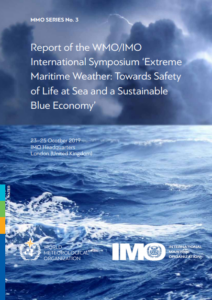Last year, the World Meteorological Organization (WMO) and the International Maritime Organization (IMO) jointly organised the first International Symposium on “Extreme Maritime Weather: Towards Safety of Life at Sea and a Sustainable Blue Economy”, while launched the report now.
According to the report, to build a broader understanding among various stakeholders will require forecasters to have a clearer understanding of forecast-dependent maritime operations and decision making and likewise will require mariners to understand the forecasting process.
The Symposium noted the importance of tightening connections in the value chain between the collection of metocean data, metocean data assimilation, marine weather forecasting, and the dissemination of marine forecasts and services to users and stakeholders.
The participants addressed opportunities for increased metocean data collection through the extant WMO Voluntary Observing Ship (VOS) programme as well as private industry (e.g. oil and gas) and observed that there is a need for more explicit encouragement for ships to actively participate in programmes as well as an improved understanding of how to better facilitate the onboard collection of metocean data.
The Symposium concluded that better communication between metocean forecasters and the maritime industry is urgently needed to ensure the safety of life and property at sea while increasing the efficiency of maritime operations.
To achieve a better relationship between the shipping industry and the environment, the participants proposed:
- Educational trainings for mariners and forecasters could help close gaps in communication between these communities
- The establishment of accredited forecast sources could increase confidence in marine hazard forecasts from such sources
- Strengthening of public-private partnerships can help increase observational data and help improve forecast products.
Overall, to learn more click herebelow


































































